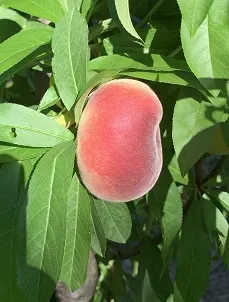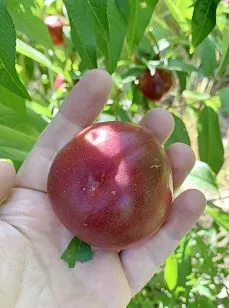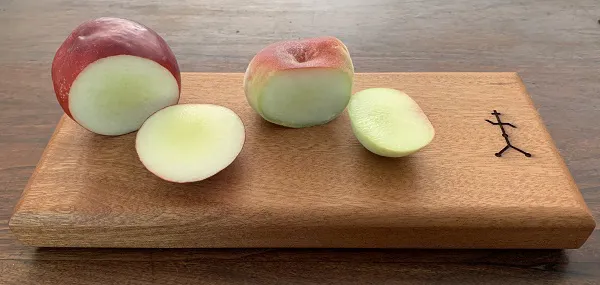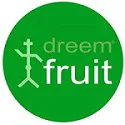The stonefruit season started around ten days late at Dreemfruit – a frustrating wait, notes Breede River Valley stonefruit farmer Leonard Droomer, but the results have been worthwhile with good volumes and good quality expected on this year’s peaches and nectarines.
Their main focus is local retail (PicknPay and Freshmark) and Marks&Spencer through Delecta in the UK.
 Their first flat peaches will be airfreighted this weekend to Marks & Spencer, a niche category on which he’d like to expand, but their trials have so far only delivered two varieties with commercial potential.
Their first flat peaches will be airfreighted this weekend to Marks & Spencer, a niche category on which he’d like to expand, but their trials have so far only delivered two varieties with commercial potential.
Trials are continuing and as soon as they identify another winning flat peach cultivar, they’ll expand their plantings.
“Flat peaches are the most difficult type of stonefruit to farm with,” he notes.
"It requires a lot of special actions in terms of pruning, but there’s good demand for it. It does have a price premium on a per kilogram basis, but because production is quite low, the returns per hectare isn’t actually much better than with nectarines.”
The nectarine harvest runs from week 46 until week 4 or 5. The earliest nectarines go to a strong local market where there’s good demand, but there is a price-sensitivity among consumers.
 Leonard has seen hundreds of varieties trialled on the farm.
Leonard has seen hundreds of varieties trialled on the farm.
The most exciting fruit among these at the moment is Boreal, a new white-fleshed nectarine variety Boreal, by PSB Producción Vegetal (right). It was released two years ago and the entire area of 120ha allocated for Boreal in South Africa has already been planted.
“Its taste, its size and its colour put it in a different league from other white-fleshed nectarines,” he says. “We can’t wait for the first fruit in a few years.”
Provar independent test block
Dreem Fruit has one of ten Provar-Hortgro independent evaluation sites which, he says, is very exciting for the industry and the specific growing area.
It is expected that the first fruit from this site should be evaluated next season and it will provide the industry with unbiased evaluation results of the different cultivars.
 Boreal on the left, a flat peach to the right (photos supplied by Dreemfruit)
Boreal on the left, a flat peach to the right (photos supplied by Dreemfruit)
"These independent evaluation sites are going to become more important and relevant, as micro-climates are changing, and farmers need to be sure that they plant well-adapted cultivars," he believes.
They have removed all of their plums as fruit set has been poor, with the idea of moving away from fruit that need cross-pollination. They will be planting their first block of Tango next year as they venture into soft citrus.
The 70 hectare farm between Worcester and Ceres is also planted to wine grapes.
 For more information:
For more information:
Leonard Droomer
Dreemfruit
Tel: +27 82 774 6841
Email: [email protected] https://www.facebook.com/dreemfruit/
